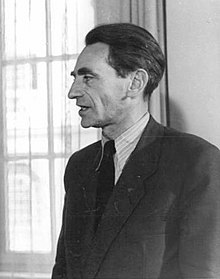Mieczysław Jastrun
Mieczysław Jastrun (born October 29, 1903 in Korolówka , Austria-Hungary ; died February 22, 1983 in Warsaw ) was a Polish writer, essayist and translator.
Life
Mieczysław Jastrun was a child of the doctor Józef Agatstein and Maria Wiensohn, he grew up in Jodłowa in Galicia . During the First World War he attended grammar school in Cracow from 1915 to 1919 . Jastrun was a soldier in the Polish-Soviet War in 1920 , but did not take part in the fighting.
Jastrun studied Polish, German and philosophy at the University of Kraków and received his doctorate in 1929. He lived in the vicinity of the Skamander poet group . His poems were also influenced by symbolism and were printed in the volumes Spotkanie w czasie (1929), Inna młodość (1933) and Strumień i milczenie (1937). He became a member of the writers' association "Związek Zawodowy Literatów Polskich" (ZZLP) and in the PEN. He worked as a teacher from 1928 until the German occupation in 1939, most recently at a high school in Łódź . During the Soviet occupation of eastern Poland from 1939 to 1941, he was a teacher in Lemberg and then under the code name Jan Klonowicz underground teacher in Warsaw. His Jewish origins were not denounced and he survived the Holocaust .
After the war he was co-editor of the short-lived communist literary magazine Kuźnica until 1949 . His volumes of poetry after the war were shaped by the experience of the occupation and the Holocaust and were based on socialist realism : Godzina strzeżona (1944), Rzecz ludzka (1946), Sezon w Alpach (1948), Rok urodzaju (1950) and Barwy ziemi (1951 ).
Jastrun wrote three biographical novels about the Polish great poets Adam Mickiewicz (1949), Spotkanie z Salomeą (1951) about Juliusz Słowacki and Poeta i dworzanin (1954) about Jan Kochanowski . In addition to Polish literature, his literary essays also dealt with Russian, French and German literature. He translated works by Lorca, Puschkin, Hölderlin and Rilke into Polish.
Jastrun had been a member of the communist party PZPR since the Polish resistance . In 1964 he pissed off the party leadership when the writer Melchior Wańkowicz was sentenced to prison and signed the "Manifesto of 34" against state censorship.
He received several awards during the Stalinist era of communist Poland, for example in 1946 he received the Cross of Merit of the Republic of Poland , the order “Banner of First Class Work” in 1949, the State First Class Prize in 1950 and 1955 and in 1954 the Order of Polonia Restituta .
Mieczysław Jastrun is buried in the Powązki cemetery .
Works in German translation
Bibliography at Culture.pl
- Poet and Hofmann: A picture by the Polish poet Jan Kochanowski . Translation by Kurt Harrer, Spiridion Wukadinović, Viktor Mika. Berlin: Rütten & Loening, 1957
- Mickiewicz . German by C. Poralla. Verse trans. by Leo Lasinsk. Berlin: Rütten & Loening, 1953
- Like the gods . Translation Karin Wolff. In: Marek Klecel: Poland between East and West. Polish essays of the 20th century. An anthology . Berlin: Suhrkamp, 1995, pp. 235–252 (first 1962)
literature
- Jastrun, Mieczysław , in: Encyclopaedia Judaica , 1972, Volume 9, Col. 1298f.
Web links
- Literature by and about Mieczysław Jastrun in the catalog of the German National Library
- Literature by and about Mieczysław Jastrun in the bibliographic database WorldCat
- Paweł Kozioł: Mieczysław Jastrun , at Culture.pl , 2010 (also contains a bibliographical overview)
- Mieczysław Jastrun , Vita at prabook (en)
- Mieczysław Jastrun , Vita at Encyclopaedia Judaica (en)
Individual evidence
- ↑ For Kuźnica see also the entry pl: Kuźnica (tygodnik) in the Polish Wikipedia.
- ↑ see Jerzy Eisler : List 34 . Warsaw: PWN, 1993
| personal data | |
|---|---|
| SURNAME | Jastrun, Mieczysław |
| ALTERNATIVE NAMES | Agatstein, Moshe (maiden name) |
| BRIEF DESCRIPTION | Polish writer and translator |
| DATE OF BIRTH | October 29, 1903 |
| PLACE OF BIRTH | Korolivka (Borschtschiw) |
| DATE OF DEATH | February 22, 1983 |
| Place of death | Warsaw |
